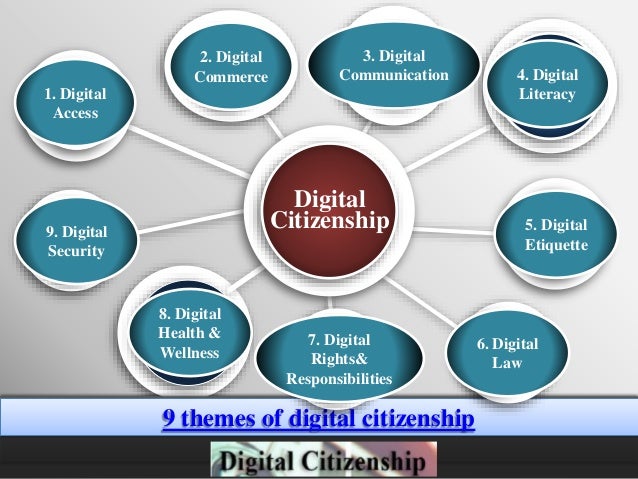
https://www.google.co.za/url?sa=i&rct=j&q=&esrc=s&source=images&cd=&cad=rja&uact=8&ved=0CAUQjhxqFQoTCKyNhceqiMkCFYHPFAodsGUGNg&url=http%3A%2F%2Fwww.slideshare.net%2Fjoh5700%2Fdigital-citizenship-37182098&psig=AFQjCNF7euJCxY85co5-4OIPMgB1OS1-Rw&ust=1447329956549907
The 9 Elements Of Digital Citizenship
1. Digital Access:
full electronic participation in society.
Technology
users need to be aware that not everyone has the same opportunities when it
comes to technology. Working toward
equal digital rights and supporting electronic access is the starting point of
Digital Citizenship. Digital exclusion makes it difficult to grow as a society
increasingly using these tools.
2. Digital
Commerce: electronic buying and selling
of goods.
The mainstream availability of Internet purchases of toys, clothing,
cars, food, etc. At the same time, an
equal amount of goods and services which are in conflict with the laws or
morals of some countries are surfacing (which might include activities such as
illegal downloading, pornography, and gambling).
3. Digital
Communication: electronic exchange of
information.
In the 21st century, communication options
have exploded to offer a wide variety of choices (e.g., e-mail, cellular
phones, instant messaging). The expanding
digital communication options have changed everything because people are able
to keep in constant communication with anyone else.
4. Digital
Literacy: process of teaching and
learning about technology and the use of technology. New
technologies are finding their way into the work place that are not being used
in schools (e.g., Videoconferencing, online sharing spaces such as wikis). In
addition, workers in many different occupations need immediate information
(just-in-time information). This process requires sophisticated searching and
processing skills (i.e., information literacy).
5. Digital Etiquette:
electronic standards of conduct or procedure.
Technology users often see this area as one of the most
pressing problems when dealing with Digital Citizenship. Rules and regulations are created or the technology is simply
banned to stop inappropriate use.
6. Digital Law: electronic responsibility for actions and
deeds
Digital law deals with the ethics of technology within a
society. Unethical use manifests itself in form of theft and/or crime. Ethical
use manifests itself in the form of abiding by the laws of society. Users need
to understand that stealing or causing damage to other people’s work, identity,
or property online is a crime.
7. Digital Rights
& Responsibilities: those freedoms
extended to everyone in a digital world.
Digital citizens have the right to privacy, free speech, etc. Basic digital
rights must be addressed, discussed, and understood in the digital world. With these rights also come responsibilities
as well. Users must help define how the
technology is to be used in an appropriate manner. In a digital society these two areas must
work together for everyone to be productive.
Eye safety, repetitive stress syndrome, and sound ergonomic
practices are issues that need to be addressed in a new technological
world. Beyond the physical issues are
those of the psychological issues that are becoming more prevalent such as
Internet addiction. Users need to be
taught that there are inherent dangers of technology. Digital Citizenship
includes a culture where technology users are taught how to protect themselves
through education and training.
9. Digital Security
(self-protection): electronic
precautions to guarantee safety.
In any society, there are individuals who steal, deface, or
disrupt other people. The same must be true for the digital security. We need to
have virus protection, backups of data, and surge control of our equipment. As
responsible citizens, we must protect our information from outside forces that
might cause disruption or harm.
http://www.digitalcitizenship.net/Nine_Elements.html
No comments:
Post a Comment